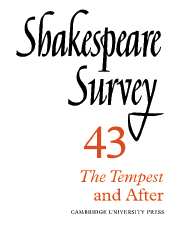Book contents
- Frontmatter
- The Power of Magic: From Endimion to The Tempest
- Reading The Tempest
- The Latter End of Prospero’s Commonwealth
- Henry VIII and the Deconstruction of History
- The Politics of Conscience in All is True (or Henry VIII)
- Shakespeare’s Romantic Innocents and the Misappropriation of the Romance Past: The Case of The Two Noble Kinsmen
- The Hand of John Fletcher in Double Falsehood
- ‘The Duke my Father’s Wrack’: The Innocence of the Restoration Tempest
- ‘Remember/First to Possess his Books’: The Appropriation of The Tempest 1700-1800
- The Tempest and After
- Poetry’s Sea-Changes: T. S. Eliot and The Tempest
- The New Function of Language in Shakespeare’s Pericles: Oath versus ‘Holy Word’
- The Discovery of The Rose Theatre: Some Implications
- The Origins of the Roxana and Messallina Illustrations
- Recycling the Early Histories: ‘The Wars of the Roses’ and ‘The Plantagenets’
- Shakespeare Production in England in 1989
- Professional Shakespeare Productions in the British Isles, January-December 1988
- The Year's Contributions to Shakespeare Studies: 1 Critical Studies
- 2 Shakespeare’s Life, Times, and Stage
- 3 Editions and Textual Studies
- Books Received
- Index
The New Function of Language in Shakespeare’s Pericles: Oath versus ‘Holy Word’
Published online by Cambridge University Press: 28 March 2007
- Frontmatter
- The Power of Magic: From Endimion to The Tempest
- Reading The Tempest
- The Latter End of Prospero’s Commonwealth
- Henry VIII and the Deconstruction of History
- The Politics of Conscience in All is True (or Henry VIII)
- Shakespeare’s Romantic Innocents and the Misappropriation of the Romance Past: The Case of The Two Noble Kinsmen
- The Hand of John Fletcher in Double Falsehood
- ‘The Duke my Father’s Wrack’: The Innocence of the Restoration Tempest
- ‘Remember/First to Possess his Books’: The Appropriation of The Tempest 1700-1800
- The Tempest and After
- Poetry’s Sea-Changes: T. S. Eliot and The Tempest
- The New Function of Language in Shakespeare’s Pericles: Oath versus ‘Holy Word’
- The Discovery of The Rose Theatre: Some Implications
- The Origins of the Roxana and Messallina Illustrations
- Recycling the Early Histories: ‘The Wars of the Roses’ and ‘The Plantagenets’
- Shakespeare Production in England in 1989
- Professional Shakespeare Productions in the British Isles, January-December 1988
- The Year's Contributions to Shakespeare Studies: 1 Critical Studies
- 2 Shakespeare’s Life, Times, and Stage
- 3 Editions and Textual Studies
- Books Received
- Index
Summary
Pericles occupies a conspicuous position in the Shakespearian corpus. The play marks its author’s departure from the tragic genre in its plot, its characterization, and the sheer time span encompassed. More importantly, however, Pericles departs from the mode of tragedy in its re-examination of the power of language, for when facing the starkness of his misfortune, Pericles refuses to speak and, thus, suppresses a mode of language which has nourished a great number of the preceding plays. When the king finally speaks, his language is no longer that of the tragic character; it is a language of amazement, surprise and celebration. Thus, the play turns upon Pericles’ resumption of speech – an action which bears a significance beyond the immediacy of the plot. The king’s speech is an affirmation of language in a much wider context, a celebration of its ability to break through the tragic vision. The question which we ask ourselves here, therefore, is most pertinent: is there a new trust in language, or rather a new vision of language’s potential to be found in this first of the romances? We shall argue that Pericles not only employs a new pattern of interchange between its characters, but that it isolates a generative principle which lies at the heart of this newly found linguistic mode.
- Type
- Chapter
- Information
- Shakespeare Survey , pp. 131 - 140Publisher: Cambridge University PressPrint publication year: 1991



